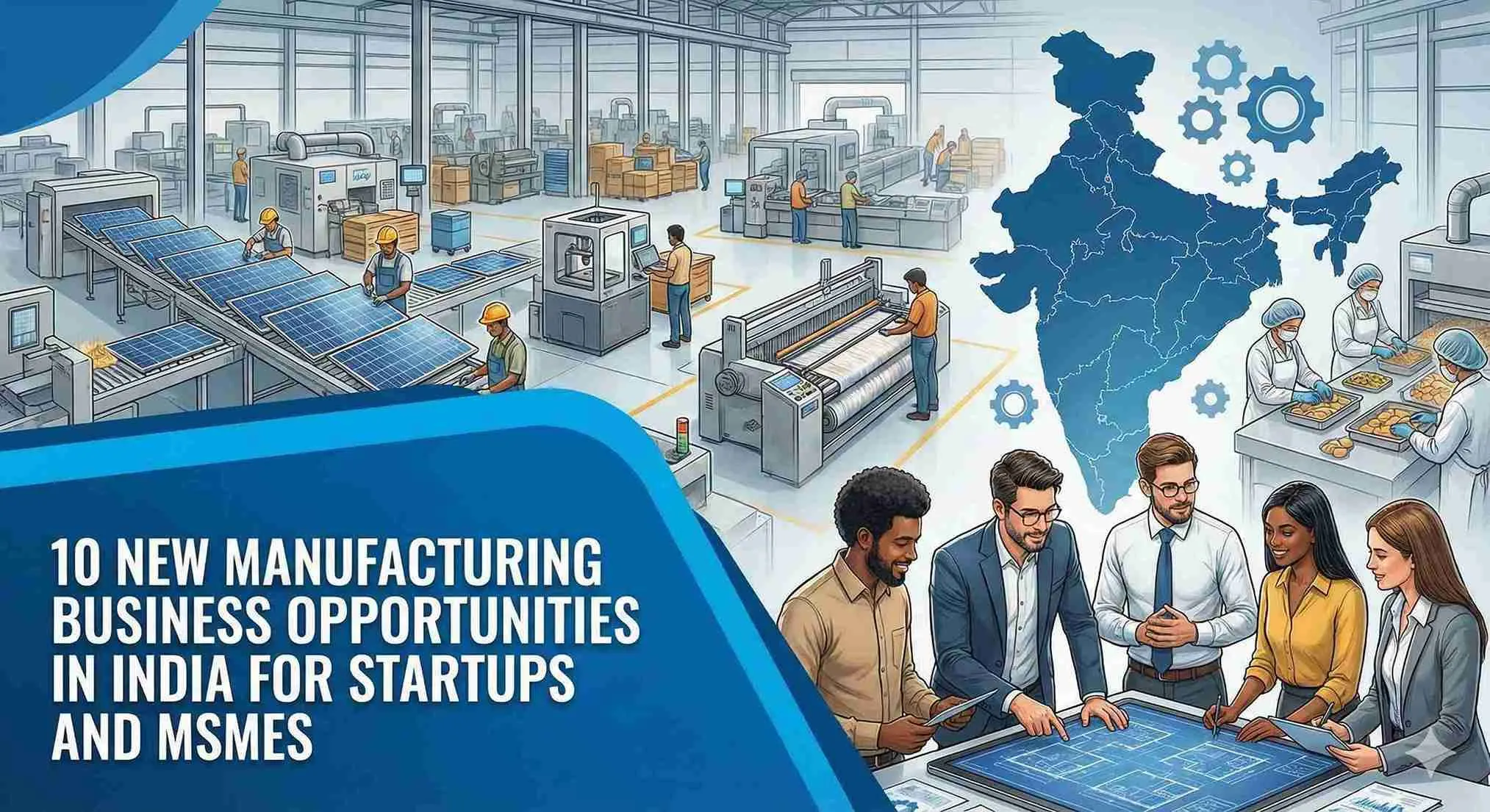Features of SME/MSME Business Loan are specifically designed to cater to the unique needs of small businesses and Micro, Small, and Medium Enterprises (MSMEs). Unlike larger organizations, these businesses have distinct operational and financial requirements. To address these, banks and financial institutions offer tailor-made loans with various privileges and benefits that support the growth and sustainability of SMEs and MSMEs.
- Lower Interest Rates: The interest rates on SME / MSME loans are much lower than standard business loans. These types of loans are often guaranteed by government schemes for SME support.
- Collateral-Free Loans: There are many banks which provide the SMEs and MSMEs with collateral free loan. This indicates that companies can get loans without having to offer any security or collateral Few banks for their SMEs and MSMEs offer unsecured loans This shows that firms can avail loans without any security or collateral.
- Numerous Repayment Alternatives: SME/MSME loans offers you multiple repayment options. Such an option can come with deferral of fixed repayment schedules linked to company cash flows, and potentially advantageous prepaying early at par, or even extensions as needed.
- Quick Disbursement: In case of SME/MSME loans, the approval time is less and they are disbursed faster so again lending company can avail funds easily.
- Online Application and Approval: Many banks enable prospective MSMEs to apply for an SME/MSME loan online. This is welcomed by small business owners, because it saves time and makes them happy.
- Loan Amount: SME/MSME loans can be anywhere from a few thousand to several crores of rupees depending on the business requirement.
- Small businesses can avail SME/MSME loans with basic documentation needed for the application.
To conclude, the SME/MSME loans help small businesses grow fast and provide swift liquidity at any point of time.
Best Industry for Doing Business, Click Here
Contents
MSME Business Loan Benefits
Business Loan is Beneficial for Micro, Small and Medium Enterprises (MSMEs) These advantages include:
Finance for Business Growth
For MSMEs, the key benefit of a business loan is having access to finance. This money can go towards buying stocks, or purchasing costly equipment or any other expansion strategies. This helps to fund the company expansion and raise profitability.
Competitive Interest Rates
The interest rates on MSME grants are much lower than the typical business loans; it is because these kinds of competitive interest rates. When borrowing is inexpensive, it becomes painless for small firms to service their existing loans.
Collateral-Free Loans
Most of the banks provide collateral free loans under this scheme for MSMEs. This makes it easier for small businesses to get financing because they do not have to collateral or guarantees when borrowing money.
Flexible Repayment Choices
MSME loans provide flexible repayment options. This can involve payment schedules tailored to the company’s cash flow, early prepayment options without penalty and, if necessary, term extensions.
Raise Credit Score
Paying the MSME loan on time and regularly helps increase the company’s credit score. Over time, this can result in easier access to loans with more favorable terms and lower interest rates.
Government Programs and Subsidies
The government from their side has launched many programs and subsidies for MSMEs. Significantly, one of them include CGTMSE (Credit Guarantee Fund Scheme for Micro and Small Enterprises) providing security free credit to MSMEs. The programs and incentives assist to lower borrowing costs and facilitate small firms access loans.
In brief, MSME loans are a great way to allow small businesses to grow their activities or for those who need capital to control their cash flow. Small businesses can obtain these loans to support their expansion and boost profitability through low-interest rates, flexible payback modes, and other benefits.
Related Feasibility Study Reports: Detailed Project Reports
How to Apply for an Online MSME Loan
Applying for an MSME loan online is easy. Here are the steps for applying for an online MSME loan:
- Examine the lender: Compare the interest rates, loan amounts, months of repayment terms and eligibility criteria along with other terms and conditions of different lenders. Select a lender that meets the needs of your business.
- Verify Your Qualification: Confirm the qualification of the MSME loan that lender is providing. Age and revenue range of the business, credit score, some cheesy orchestration with other foolish elements etc.
- Compile the Necessary Paperwork: To get the ball rolling on your loan request, the lender requires a few identification documents. Among these are PAN cards, Aadhaar cards, bank statements, income tax returns and more. Be certain to possess all of the documentation on hand.
- Complete the Application: Most of the lenders provide an online application for MSME loans Fill out the application correctly and completely.
- Submit the Application and Supporting Paperwork: Finally, after you fill out the application form make sure to submit it with all documents. An extra processing fee is also charged.
- Await Approval: Loan docs, why you want the loan; processes in 24 hours. The lender will send the money directly to your bank account if your application is approved.
- Pay Back The Loan: Once you get the loan need to fulfil terms and conditions bout interest on it, fail to so will default right of lending telemetry agreed up on with terms.
Following these steps, you can avail an MSME loan online and get access to the capital that your firm needs to grow.
Application Eligibility for an MSME Loan
The following are the various eligibility criteria that a borrower needs to meet in order to avail of an MSME loan. Though every lender has its own specific requirements, here are some of the baseline requirements you will find most everywhere:
Business Registration
It should register as a sole proprietorship, partnership under sections 45-ZA and 45-ZB, LLP (Limited Liability Partnership), or any other legal business entity permitted under the applicable law.
Firm Vintage
Most lenders require a firm to be at least two years old; however, some may require it to be at least three years.
Turnover
The company’s annual turnover must lie within the range defined by the lender. While it can be different from lender to lender but generally, it is between Rs. 3 Lakhs — Rs. 100 crores.
Credit Score
But everything is focused on this Grade-A company with a shiny new credit score. Anything over 650 is generally good.
Financial Accounts
The lender then will assess the company’s financial condition through those provided financial statements.
Profitability
The company must have been profitable for the past two or three years. This is because the lender will dictate the loan size and interest rate according to how strong your business is.
Collateral
This term is similar to security, and just means that you provide an asset as security for a loan. However, many of the lenders also grant loan for MSMEs without requiring a collateral.
Business Plan
The lender may want a business plan that describes how the loan proceeds will be used and how they will benefit the company.
The above are just a few of the prerequisites for an MSME loan, which can vary between lenders and the amount of loan among other things. Before you process the loan, be sure to verify that you are qualified as per the lenders in your area.
What Distinguishes A SME Loan From An MSME Loan?
People refer to small enterprises as SMEs (Small and Medium Enterprises) and MSMEs (Micro, Small, and Medium Enterprises). The gap between SME and MSME loans does exist, though.
SME loans are generally available to businesses having an annual turnover ranging from Rs. 5 crores to Rs. 250 crores Banks and other financial institutions typically provide these loans to help small- and medium-sized businesses in fulfilling their financial requirements.
If the firm has a turnover of more than Rs 5 crores, then it can avail business loan for MSME whereas if turnover is less than Rs 5 crores the MSME loans are eligible. Borrowers can apply for these loans through banks, non-banking financial institutions (NBFIs), and government programs. This lets you get financing to grow your business with their MSME loans for micro, small, and medium companies.
Here we show the comparison of features and benefits of SME Loans vs MSME Loans. These include higher loan amounts, longer tenure and lower interest rates than MSME loans. SME loans require more documentation and better credit score, compared to MSME loans.
While both types of loans suit small enterprises, they contrast vastly in qualifying requirements, loan amounts and interest rates and other attributes.
What is the APR on a loan for MSMEs?
Certainly, the lender, loan amount, and duration for repayment related to the borrower [CIBIL score], etc. control interest outcomes of MSME loans. Here are some of the common pointers for MSME loan interest rates:
- Government Programs: The government for MSMEs has a lot of programs like the collateral free loans that offers to MSME through CGTMSE, which created by Government and also many more such facility. These loans are often provided at 7.5–9.5% interest rates.
- Banks and NBFCs: Banks as well as NBFC offer MSME credits with competitive interest rates ranging between 9–20%, which are the most widely prevalent scenario. The charging of interest can vary according to the credit score which is on a credit card by the borrower, revenue being provided by the firm and many other things.
- Collateral: If you have to offer any security/collateral against the MSME loan, then the interest rate of your MSME loan may be less as compared to unsecured (without collateral) loans.
- Loan Amount: The interest rate for MSME loans are highly dependent on the loan amount. Understand that larger the sum more what loans raise.
- Credit Score: Those who have a good credit are offered lower interest rates as to those who has the bad credit.
Hence, it varies from lender to lender and depends upon the creditworthiness of borrower as well on both ends may be up or down. Shopping around different lenders before settling on one is very important as far as getting the best deal so you can compare the interest rates and other features of each loan.
What Is The MSME Loan Processing Fee?
The processing fee for MSME loans can vary; it depends on the lender and loan amount. Lenders do usually charge processing fees for their administrative and miscellaneous costs incurred in evaluating the loan application. Above mentioned points are some generic lays so here is something the broad rules in case of MSME loan processing fees:
- Government Programs: Government programs may waive or reduce the processing fee for loans sanctioned to MSMEs.
- Banks and NBFCs: Banks and NBFCs may charge up to 0.5-2% of the loan amount as processing fee Costs might change relying on mortgage quantity, mortgage time period and different components.
- Collateral: The processing costs of MSME loans with collateral can be lower than that without any security.
- Loan Amount: We will change the loan amount. The processing charge may vary based on the loan amount. The processing cost may decrease as the loan amount increases.
- Credit Score: It is possible that it may also levy lower processing fees for applicants with a high Credit Score as against one who has a low Credit Score.
Should attach details of Processing Cost and other charges, before and taken applying for an MSME Loan. You should also carefully read your loan agreement and be fully aware of every cost of your loan, as some lenders also like to hit borrowers with prepayment penalties or other hidden fees.
New MSME Definition
To give these small firms more flexibility and advantages, the Indian government amended the definition of MSMEs in June 2020. The following is the revised definition of MSMEs:
- Micro Enterprises: An organization is considered a micro-enterprise if it has a turnover of less than Rs. 5 crore and an investment of less than Rs. 1 crore.
- Small Enterprises: An organization is considered a small enterprise if its investment is less than Rs. 10 crore and its annual revenue is less than Rs. 50 crore.
- Medium Enterprises: An organization is considered a medium enterprise if its investment is less than Rs. 50 crore and its annual revenue is less than Rs. 250 crore.
More small enterprises can now qualify as MSMEs and receive government programs and subsidies thanks to the new definition’s higher investment cap. Adding turnover as a criterion in the new definition is expected to help expanding enterprises more.
In addition, the government has launched a number of initiatives to assist MSMEs in the COVID-19 pandemic, including collateral-free loans, credit guarantees, and interest rate subsidies. These actions provide financial assistance and help MSMEs recover from the pandemic’s effects.
Visit the page Select and Choose the Right Business Startup for You for sorting out the questions arising in your mind before starting any business and know which start-up you can plan.
We, at NPCS, endeavor to make business selection a simple and convenient step for any entrepreneur/startup. Our expert team, by capitalizing on its dexterity and decade’s long experience in the field, has created a list of profitable ventures for entrepreneurs who wish to diversify or venture. The list so mentioned is updated regularly to give you a regular dose of new emerging opportunities.
Businessmen and entrepreneurs might benefit from obtaining detailed reports from NPCS (Niir Project Consultancy Services), and they soon recognize this through resource sales. Following are few justifications for purchasing NPCS report:
In conclusion, NPCS report is really valuable for identifying a sector, decision-making and launching any product into the market or investment strategy.
Contact Us
Frequently Asked Question
What are the key features of SME / MSME business loans?
SME and MSME business loans typically offer flexible loan amounts, competitive interest rates, quick approval and disbursal, and flexible repayment tenures to suit business cash flows.
Do MSME loans require collateral or extensive documentation?
These loans often come with minimal documentation requirements, and many schemes allow collateral?free or unsecured loans, especially under credit guarantee programs like CGTMSE.
How long is the repayment period for MSME business loans?
Repayment tenures are typically flexible, ranging from about 12 months up to 7–10 years or more, depending on the lender and loan type.
Can MSME loans be used for different business needs?
Yes. These loans can be used for working capital, equipment and machinery purchase, expansion, technology upgrades, and even managing cash flow gaps.














